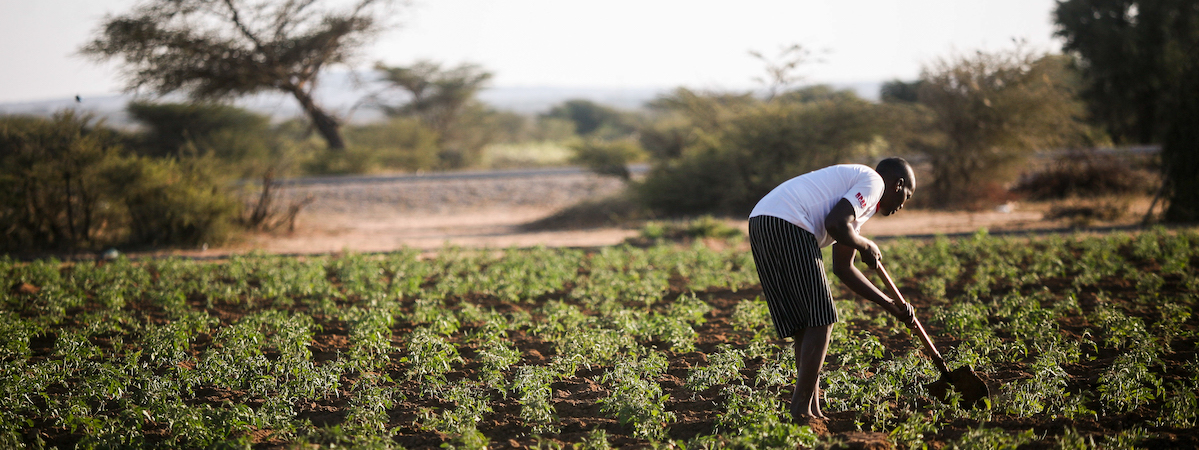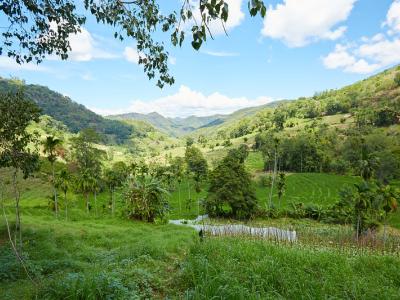
Somalia is a country located in the Horn of Africa, with the longest coastline of Africa’s mainland. The country is considered one of the poorest countries of the continent, with 80 percent of the population being youth. Close to 60 percent live in rural areas as nomadic and semi-nomadic pastoralists. Somalia’s economy relies heavily on agriculture and livestock, accounting for more than 70 percent of the GDP (Gross Domestic Product) and employment. As an arid and semi-arid country, Somalia is deeply impacted by climate change, which has partly fueled a humanitarian crisis depleting natural resources and diminishing ground water levels.
Close to 30 percent of the land is considered degraded. Recurring floods and droughts, as well as desert locust infestation pose the most severe threat to agricultural production and the country’s development. Rainfed-grown staple crops, such as maize and sorghum are major cereal crops cultivated in Somalia, the latter representing close to 60 percent of the total cereal production. In addition, the country is the eighth largest exporter of sesame of the world, which is grown as a traditional cash crop but is significantly impacted by climate change.
- National Governments
- Food and Agriculture Organization of the United Nations (FAO)
- United Nations Development Programme (UNDP)
In 2013, the country formulated its National Adaptation Programme of Action (NAPA) and submitted its first nationally determined contribution (NDC) in 2015. Somalia set an ambitious emissions reduction target of 30 percent business-as-usual by 2030, conditional on international public and private support. Somalia submitted its updated NDC in 2021, which highlights different adaptation initiatives to be implemented over the next 10 years to 2030, setting quantifiable targets, inter alia, in the agriculture and forestry sectors. The government has committed to establishing a national climate change adaptation planning framework.
Somalia’s priority areas for climate change adaptation from 2021 to 2030 are informed by its 2020 Adaptation Baseline Assessment and based on Somalia's national and sub-national adaptation plans and policies, including NAPA. The country has initiated its National Adaptation Plan (NAP) process and has started to implement a Readiness project to enhance its capacity and institutional frameworks and define adaptation actions in priority sectors.
In addition, FAO is designing a project ‘Climate Resilient Agriculture in Somalia’ to be submitted to the Green Climate Fund. The project’s objective is to enhance the resilience of rural communities and ecosystems in Lower Shabelle, Puntland and Somaliland to climate change by sustainable management of natural resources and by developing value chains to strengthen their capacity to overcome negative effects/impacts of extreme events and other climate hazards.
In July 2022, the Government of Somalia expressed their interest in receiving support from the SCALA programme, which supports countries to build adaptive capacity and reduce greenhouse gas emissions to meet targets set out in their National Adaptation Plans (NAPs) and nationally determined contributions (NDCs).
The proposed climate adaptation measures in Somalia include the diversification of food production appropriate to the natural ecosystem and enhancement of farm-based livelihoods. The priority areas outlined in the country’s NDC include the promotion of agroforestry practices, rehabilitation of rural ecosystems and implementation of climate-smart agriculture practices, as well as the development of irrigation systems, including dams, channel & water reticulation system. It also promotes rainwater harvesting and water conservation, including improved water use efficiency.
To attain these objectives, and to strategically contribute to the country’s NAPA and NDC targets, Somalia requests assistance to conduct a detailed value chain ecosystem mapping and analysis for sorghum, maize, and sesame value chains with a focus on identifying private sector adaptation challenges and barriers, technologies and practices, losses due to droughts and floods, investment potential and incentives to participate in public dialogue. It is expected the intervention can inform climate policy and support the design of climate-resilient and gender responsive interventions.
Scope of work
Private sector and ecosystem mapping and analysis of sorghum, maize, and sesame value chains.
Activities include:
- Sorghum, maize, and sesame value chain overview
- Private sector and ecosystem mapping
- Market, gender, and stakeholder private stakeholder analysis
- Validation workshop





